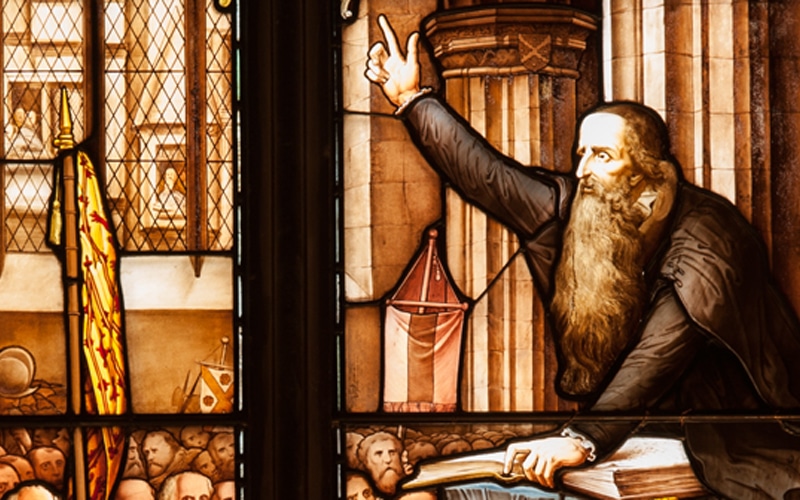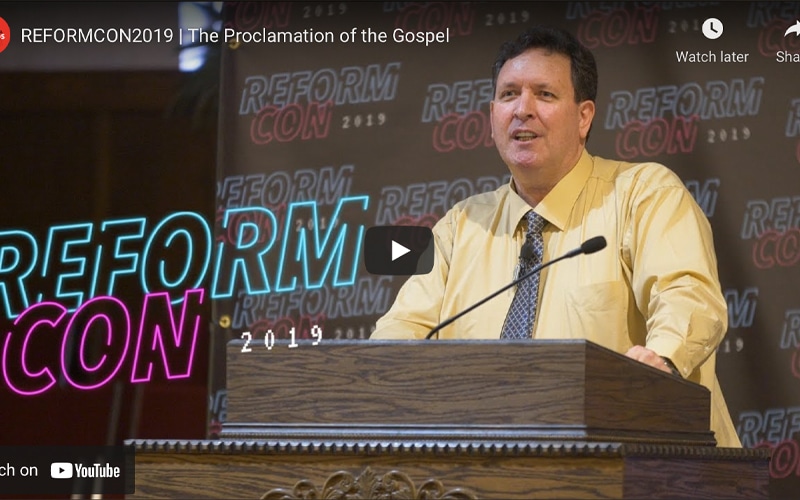
by John Samson | Dec 16, 2018 | Articles
God-Centered
Worship is the expression of praise, glory, thanks, honor, submission and devotion and is to be given to God alone. All else is idolatry. Therefore, Reformed worship is intentionally God-ward, celebrating all that He is and all that He has done in creation and redemption. Worship is not about our feelings or ‘worship experience’ and therefore is not devised according to what will attract or satisfy the sinner. God alone is our target audience in worship. It is for God, about God, and focused solely upon God. We recognize that if God is pleased it does not matter who is displeased, and if He is displeased, it does not matter who is pleased.
Triune in Orientation
God has revealed Himself in creation and especially in the Bible. Biblical worship recognizes we worship the one true God who is eternally existent in three Persons, the Father, the Son, and the Holy Spirit. All of our worship is shaped by this revelation.
Covenantal
Biblical worship is based upon a covenant relationship. Not everyone can legitimately call Him ‘Father’ but only those in covenant relationship with Him. We also recognize that this relationship is made possible only by the sin bearing, atoning cross-work of the Lord Jesus Christ in His death for us, and the perfect obedience and righteousness He achieved for us in His life. Based on the sure foundation of Scripture alone, justification is by grace alone, through faith alone, in Christ alone, to the glory of God alone.
Regulated by Scripture
God determines how He will be worshiped and He has not left us to guess what that involves. The Regulative Principle of Worship acknowledges that we are to do only those things in worship which God has commanded in His Word. We are not free to innovate, revise, or supplement the elements of worship commanded by God in Scripture. We are to be careful to do according to the mandates laid out for us.
Sober, Yet Joyful
The Bible makes it clear that worshiping God is a highly serious matter and yet Christians ought to do so with reverent and overflowing joy. Worship is not a concert for man’s enjoyment. Preaching is not a public speech to dispense information or to entertain. Preaching is a central component of our worship. God addresses His people through the reading and proclamation of His word, and His people respond in faith, thanksgiving, and praise.
A Holy Dialogue
Worship in the Bible was a dialogue between God and His covenant people, and so should it be in churches today. Our service begins with God addressing His gathered people in His solemn call to worship. Hearing His call, we respond with joy. God reveals His holy Law and we recognize our guilt and confess our sins. God pronounces His word, and we believe and renew our commitment to Him. He serves His people a family, covenant meal at His Table and we believe His gospel promise and feast on Him. As we turn from sin and trust the finished and perfect work of the perfect Savior alone, He assures us of His full pardon. We respond with thanksgiving and praise. Our worship ends with God addressing His children with words of benediction. This dialogue between God and His assembled covenant people is the rhythm of worship in Scripture, and it shapes the structure of our liturgy every Lord’s Day.

by John Samson | Jun 25, 2019 | Articles
As we read the book of Acts, chapter 2, a definite sequence can be observed. All who repented and believed the gospel were water baptized and in doing so were recognized as full citizens in God’s kingdom and immediately became active members in the local Church.
“So then, those who had received his word were baptized; and that day there were added about three thousand souls. They were continually devoting themselves to the apostles’ teaching and to fellowship, to the breaking of bread and to prayer.” – Acts 2:41,42
Repentance involves a change of mind resulting in a complete change of direction – a 180 degree about-face – turning away from a self-centered life of sin and a turning to God.
Faith means believing the gospel of the Lord Jesus Christ, confessing Him as personal Lord and Savior, trusting in His complete redemptive work in His perfect life, His atoning death and His physical resurrection – being saved from the wrath we deserve by grace alone through faith alone in Christ alone.
Water Baptism refers to full immersion in water. Baptism does not save! This cannot be over-emphasized! We are saved by grace alone, through faith alone, in Christ alone, plus nothing… minus nothing… However, those who are “saved” are immediately commanded to be water baptized, which involves a personal declaration of full identification and complete union with the Lord Jesus Christ in His death, burial, resurrection and ascension.
Using a sports analogy, water baptism is like putting the team jersey on, which then allows the player to enter the field of play. No one plays on the field without the uniform. So, while you may be a genuine Christian, the Lord Jesus commands you to be water baptized. Baptism is a matter of obedience as a follower of Christ. Acts 2:38 says, “Repent and be baptized every one of you…”
Membership in the Local Church: Believers share a rich spiritual life together as brothers and sisters in the family of God. The Lord has established the local Church as the designated place for each baptized believer to gather together to receive the ‘means of grace’ – where the word (gospel) is rightly preached and the sacraments rightly administered. It’s the setting for each believer to give and to enjoy Christian fellowship and support, all in a protected environment under the watchful care of His under shepherds (elders).
If we were to imagine being present to observe the events of Acts chapter 2, can you imagine someone coming to the Apostles and asking something like, “I am not wishing to be baptized but would like to receive the Lord’s Supper. Is that ok?”
I think the short answer such a person would receive would be, “No, that is not ok!”
Instead questions might be asked of this person such as “Why would you not wish to be identified with the Lord Jesus Christ in baptism? Do you not believe in Him? If you do believe in Him, why would you not obey Him? Are you really a follower of Christ? If you are, why would you not wish to identify with Him in the way He has commanded?”
The Lord’s Supper is not an outreach tool for evangelism but a holy ordinance for the people of God. It is a family meal for those who are identified with Christ in baptism and members of the local Church.
In our day, the Church has adopted many non-biblical ideas and traditions in presenting the gospel. These include raising a hand, walking an aisle, praying “the sinner’s prayer” and signing a card… What do all these have in common? The answer is: None of these are mentioned in Scripture. These are man-made substitutes for the public declaration of our repentance and faith expressed in obeying the command to be baptized in water and then becoming members of a local Church. There is no doubt that today’s widespread non-biblical practices in the Christian community has led to much confusion in the minds of many. Yet the Bible is more than clear on these matters.
In the early Church, there was not such a “thing” as an unbaptized Christian. All who received God’s word (who believed) were baptized; who were then added to the Church as members; and all of these began to participate in the everyday life of the Church; teaching, prayer, fellowship and the Lord’s Supper.
Note once again the sequence found in Acts 2:
“So then, those who had received his word were baptized; and that day there were added about three thousand souls. They were continually devoting themselves to the apostles’ teaching and to fellowship, to the breaking of bread and to prayer.” – v. 41,42
No one fell through the cracks. There were no cracks. All who repented and believed were water baptized and added to the church in membership and then participated in the life and benefits of the local Church. I believe this is the Biblical pattern for us today.
Here is a helpful interchange found at the 9Marks website, in the form of a question and answer dialog:
Dear 9Marks,
Question: I’m in agreement with your explanation on child baptism. My children (ages 14 and 12) give strong evidence of saving faith, yet we have decided to wait on baptism for some of the reasons you state. The struggle I have is how this affects the Lord’s Supper. Would you also say that only baptized believers should take part in communion? We began having our children participate in communion when my son turned 12 and my daughter turned 11. If this is improper (due to them not being baptized yet), are we not then withholding the blessing of the Lord’s Supper from our believing children?
—Adam
Dear Adam,
The short answer is, I agree with the fairly traditional line that you will find in most Baptist statements of faith, namely, that baptism “is a prerequisite to the privileges of church membership and to the Lord’s Supper” (Baptist Faith & Message 2000). Baptism is the front door to the church through which you walk once; the Lord’s Supper is the family meal that you enjoy repeatedly and regularly.
So, no, I would not give the Lord’s Supper to anyone who has not received baptism. And for what it’s worth, that’s not just a Baptist position, but something that every Christian tradition has historically affirmed (Presbyterians, Anglicans, Lutherans, Eastern Orthodox, Roman Catholic, etc.). Baptism, then the Supper.
Baptism and the Lord’s Supper are the two signs given to churches by Christ to mark off those who belong to him. Who are the people of God on earth? Those who are baptized into church membership and then receive the Lord’s Supper. They are public identity markers, and they are meant to go together. They are not just individual acts, but corporate acts. It’s not just the individual saying something in baptism and the Lord’s Supper, it’s the church saying something as well.
In baptism, the church declares that someone is identified with “the name” of Father, Son, and Spirit (Matt. 28:19), such that those individuals can now gather “in the name” of Christ (Matt. 18:20). In the Lord’s Supper, every member of the church declares themselves to be a part of the one body, and the one body declares every member to be a member of that one body.
Paul writes this in 1 Cor. 10:16-17, “The cup of blessing that we give thanks for, is it not a sharing in the blood of Christ? The bread that we break, is it not a sharing in the body of Christ? Because there is one bread, we who are many are one body, for all of us share that one bread.”
In light of all this, I have two questions for you: (i) what blessing do you think you are withholding from your children? The unique blessing that the Supper offers is for individual and church to declare together that they are one body. But it seems like you deliberately mean to withhold that blessing by not baptizing your children. (ii) You refer to your “believing children.” If you are willing to confidently affirm them as Christians, why wouldn’t you ask the church to baptize them and affirm them as Christians?
In other words, what I hear you saying is, you’re willing to have the church affirm them as believers through the Supper, but you’re not willing to have the church affirm them as believers in baptism. I’d encourage you to give both of the ordinances to your children, or neither. The ordinances are not meant to be divided, where we give one but not the other. Most Paedobaptists do, I understand (giving baptism but withholding the Supper for a time), but you didn’t pose your question to a Paedobaptist! I hope this is helpful.

by John Samson | Aug 12, 2020 | Articles
Dave Hanson, a member of King’s Church, wrote the following email to me this week (August 12, 2020):
Hey Pastor,
While in the hospital and now that I am home, I’ve had time to reflect on the last 10 days. I want you to know that Suzanne and I are so thankful that we found you and the brothers and sisters at Kings Church. I actually found your blog about a year and a half and followed that before I first saw you on the dividing line (Dr. James White’s podcast).
I remember the program you had a mask of the Queen of England on your face. I can’t remember why but your sense of humor and your practical teaching won me over. When I found out you had started a church in Phoenix I prayed about checking it out for a few months, because we didn’t think we were being fed properly at the church we were at. This was the best move we have made! We have grown so much in the last I guess it’s been almost five years at Kings Church, it’s hard to believe it’s been that long – time sure flies.
Any way I say all of that to say this, because of all that I have learned over the last five years I was better prepared for this time when God in his providence put me through this health trial. I went in knowing that God is sovereign and in his power, wisdom and love, He would ultimately be glorified and it would be for my good. So I was determined to glorify God in this trial no matter what the outcome whether death or recovery! It was almost death.
On Friday, Suzanne and I were saying our goodbyes as we didn’t think I was going to make it, and I wanted to die at home and not by myself in the hospital. Suzanne started calling people from the church and people started praying and almost immediately my health started to improve. My body was still shutting down and there was damage to my liver but the doctors were able to stop the rejection and I started to heal remarkably fast.
While the rest of the patients in my wing suffering from the same thing were miserable and could not get out their beds they were suffering so much, I had no pain, just yellow eyes and skin. I ended up being able to read and pray for our church, listen to sermons, it was just like I do every day at home. My labs kept getting better every day and I got out of the hospital early, and I owe it all to you and the Kings Church family for yours and their prayers, which God in His providence answered, and all the words of encouragement I received.
It’s nice to know we don’t have to go through these tests alone – not when we have a sovereign holy God dwelling in us and with us and the local body of Christ standing with us. I am so blessed to be part of this fellowship.
Thanks again,
Dave H

by John Samson | Dec 3, 2020 | Articles
For me, the mystery of the Trinity is way more than my mind can handle. Way more!
Here is what we know: there is one God and yet three Divine Persons, Father, Son and Holy Spirit. The Father is not the Son; the Son is not the Spirit; and the Spirit is not the Father. All three members of the Godhead possess the attributes of personality.
In the garden, the Lord Jesus prayed “not My will but Yours (Father) be done”. This speaks of yet another mystery – Christ is one Person with two natures, one truly human, the other truly Divine. At Gethsemane, Jesus prayed as the God-Man – His human will wishing to avoid the agonies of the cross and all that this would mean in terms of the Father’s wrath being poured out on Him (“this cup” as He called it), yet submitted Himself to the will of the Father.
In glorious, majestic, beautiful, divinity, the Father, Son and Spirit are one in mission. There is never opposition of will between the Members of the Trinity. There has never been a single argument between them – they are forever united in what they intend to do and from eternity have acted in complete unity always, even as they have distinct roles to carry out for the purpose of our redemption. It is the Father who sends the Son into the world; the Son lives and then dies for us; and the Spirit applies the work of redemption to those God elected and the Son died for. Amazing beyond words! And that is about as far as my mind can go and prove from Scripture.
Beyond the boundaries we find in God’s revelation of Himself in Scripture there is only speculation and the treacherous fall off the cliff of orthodoxy into heresy and damnation. As Calvin rightly said, “Where God closes His holy mouth, I will desist from inquiry.”
Two final thoughts:
- One in essence, three in Persons; one “what” and three “who’s” – while fathomless mystery, is no contradiction.
- God has revealed all He has about Himself that we would have more than enough to forever stand in awe of Him and find boundless joy and delight in all He is as our glorious Triune God, for eternity.






